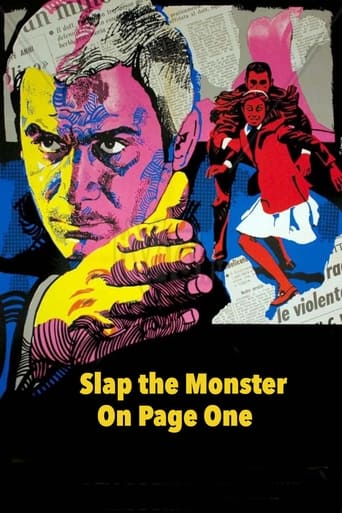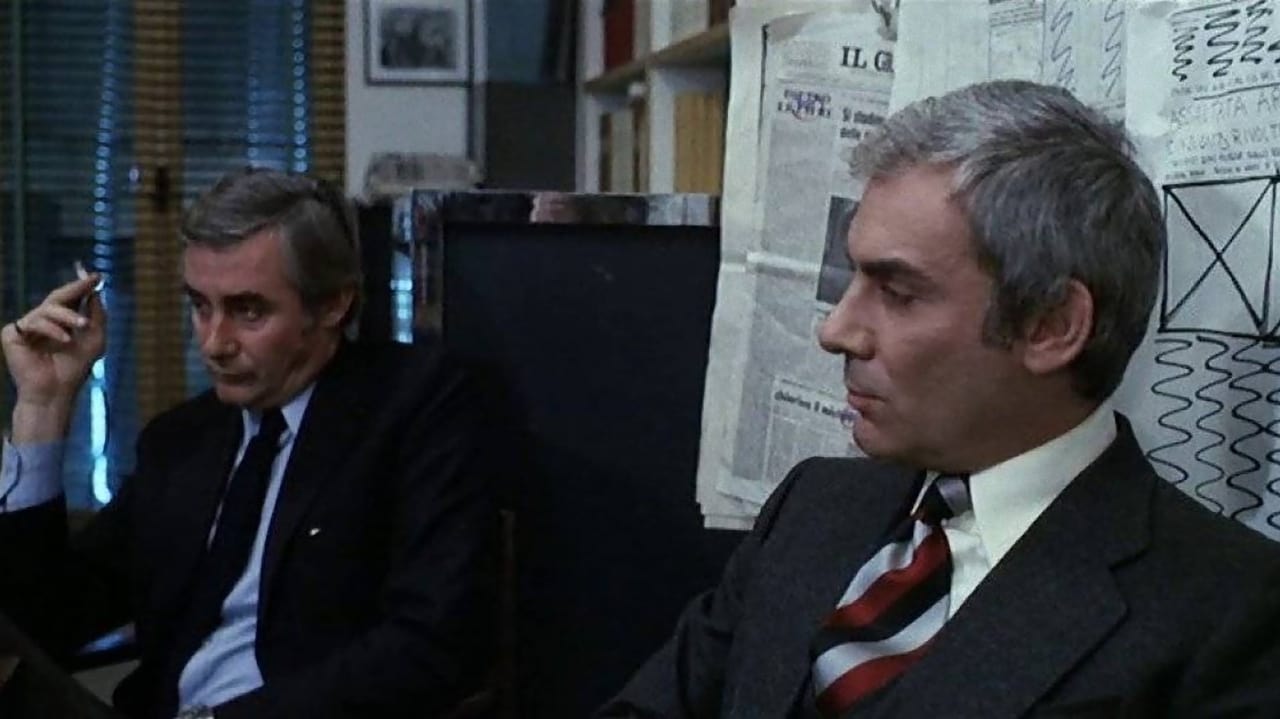philosopherjack
Marco Bellocchio's Slap the Monster on Page One certainly reflects a particular time and place, seeped in the self-satisfied calculations of the monied Italian establishment, but it resonates bleakly in our time of heightened political cynicism and authoritarianism and of systematic disregard for truth. Gian Maria Volonte's Bizanti is the editor-in-chief of a prominent newspaper, leading its self-portrayal as a societal bulwark against violent leftist forces. When a young well-connected woman is brutally murdered, the paper seizes on the story in the way media always does, as a flagrant circulation booster and, when a likely suspect emerges, as particularly potent evidence of the degradation of the left. But the reporter on the story becomes aware that the trail is all too well-lit and the conclusion is too convenient a contribution to the narrative of a looming election; his reward for his awakening is to get fired. The film's subtlety lies in how Bizanti isn't at all oblivious to his personal corruption and culpability: on the contrary, he exults in it, seeing himself as the operator of an elaborate machine contributing to keep the worker suitably and obediently incentivized, and at the same time implicitly assuming that the worker understands and accepts his subjection to this calculated narcotic. Anyone who can't perceive (and it seems even appreciate, as one does a work of art) the workings of this system is merely a contemptible moron - including his wife, as he expresses in a memorably cruel outburst. In the end the truth is placed safely in storage, although with an understanding that it may be allowed to emerge in the future depending on the outcome of the election; the film ends on images of the Catholic church (by then degraded by an earlier deranged juxtaposition of the dead girl with the Virgin Mary) and then - amusingly if not subtly - on a river of garbage. Concise, dark and potent, the film might still be capable of inciting outrage, at least for a viewer still in possession of any sense of societal optimism.
PimpinAinttEasy
This is a film I watched only because I am a big fan of Gian Maria Volante. I'm not aware of the political context of this film.The film came across as a one sided political satire that is severely critical of a right wing newspaper and its almost godlike ability to manufacture popular opinion. The film is also a sort of a murder mystery with a brief account of a love triangle.The murder of a teenage girl provides an opportunity for a right-wing newspaper to blame the crime on a communist activist, just before an important election. The film provides a detailed account of how the editor of the newspaper (played by Volante)and his colleagues goes about manipulating the public opinion against the communists.Laura Betti was very good as a jealous lover. The scene where she reads out of her rival's (the teenage girl) diary is quite hilarious. Volante's performance seemed to be uninspired. His role as the evil conniving editor of the right wing newspaper where he simply walks into witnesses, reporters and suspects houses and convinces them to support the case against the communists was hard to digest. The scene where he manipulates Betti's character was rubbish.The editing was flawed because scenes seemed to end rather abruptly. Background score was quite good but was used minimally.There were some nice directorial flourishes like the ending with a dry canal being filled with polluted waste filled water.
christopher-underwood
Really good, solid, political film making from a new fave of mine, Marco Belloccio. Indeed this taut thriller mixes the murky world of newspapers with the equally murky world of politics. This opens with in your face real footage of early 70s street riots in Milan. Such is the ferocity and spectacle it seems likely that once the narrative begins there will be an anti-climatic lull. Not at all, Gian Maria Volonte stars as the newspaper boss prepared to do anything for his fascist friends and the survival of his newspaper. His cynicism and by implication that of the director knows no bounds. An innocent schoolgirl is raped, there is a clear guilty party but does it suit the ends of those in charge for matters to proceed as they should? Volonte is masterly in the role, as he was in the slightly earlier, Investigation of a Citizen Above Suspicion but he is aided here by more than adequate support from all involved. Thrilling, disturbing and very provocative.
MARIO GAUCI
Considering the sheer amount of (vaguely boring) movies flaunting their individual creator's extreme left-wing politics to emerge from Europe throughout the 1960s and 1970s, it is hard in hindsight to believe just how many talented film-makers were 'duped' into upholding such naïve ideals; that said, the other side of the coin – basically equating Fascism – was even less comforting and that more dangerous
but it does make for rather intriguing (and ultimately more rewarding) cinema! Bellocchio's film, then, was one of a handful of titles to look at this alternative 'option': perhaps the most famous such example was Elio Petri's Oscar-winning INVESTIGATION OF A CITIZEN ABOVE SUSPICION (1970), which shares with the picture under review its leading man – Gian Maria Volonte'; like that one and Dino Risi's similarly excellent IN NOME DEL POPOLO ITALIANO (1971), the film takes the form of a thriller – both this and the latter, in fact, involve the investigation into the rape and murder of a teenager emanating from high society: here, a radical is accused of the crime – and hounded by Volonte''s opportunistic newspaper for it – but the guilty party turns out to be somebody else, ferreted by a reporter not taken in by his superior's wiles, who is pursued in turn (and even blackmailed!) by the unscrupulous editor. The movie paints a most cynical image of the press, beginning with Volonte' 'embellishing' – and directing his underlings to shoot – a fire that broke out at the office during a riot (he is seen making intermittent contact throughout with the politically-affiliated young owner of the paper, played by "Euro-Cult" stalwart John Steiner); later on, while viewing the TV broadcast of a talk-show he was involved in, the man even takes it upon his wife – for her passivity and intellectual limitations!; however, the worst victim of his dishonesty is the uncouth schoolteacher (Laura Betti) he befriended in order to exploit for her affair with the murder suspect – one of the film's best sequences is the one where she is made to confront her lover's fellow activists in the police station. The film features a good Morricone-esquire score by Nicola Piovani and ends on a shot depicting the rampant pollution at the city limits – a metaphor for the so-called "yellow press" and remarkably similar to the finale of yet another newspaper movie, the classic FIVE STAR FINAL (1931).


 AD
AD


